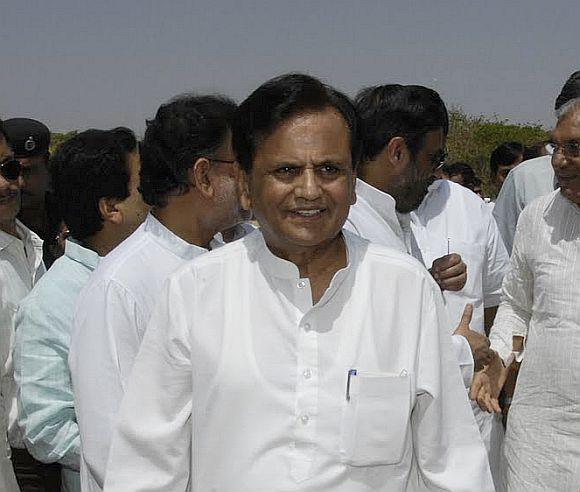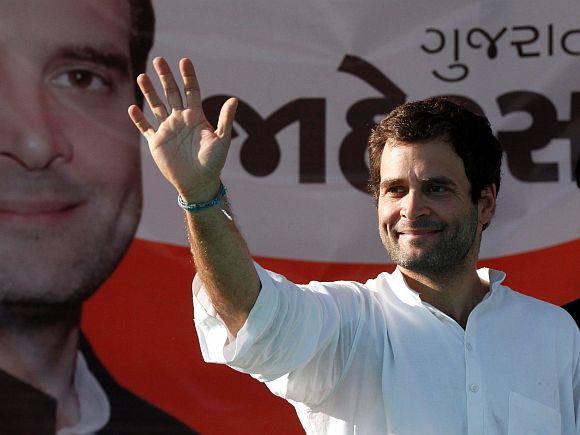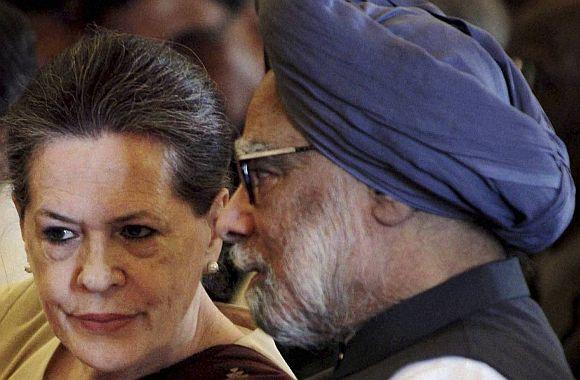
Ahmed Patel, the most powerful man in the Congress party after the Gandhis, speaks to Rediff.com's Sheela Bhatt in a rare and exclusive interview.
It's not easy to know Ahmed Patel.
He is low-profile, silent, secretive, inscrutable and cagey.
Patel, 63, is Congress President Sonia Gandhi's political secretary, but party leaders think he is her "political advisor."
He is not just "low-profile", he ensures that he gets no "profile" in New Delhi's all-pervasive media.
A kind of mystery surrounds him because he never speaks; he only smiles playfully when asked awkward questions
He is extraordinarily edgy about anything written on him. He has been gifted with the political talent of giving a patient hearing to disgruntled elements in his party, who are in their thousands.
There is no surprise that he is the most envied man in the party. His critics in the Congress say he is a manipulator, but if you speak to him about his moves and games, he keeps repeating that he is "unfit in politics."
Senior party leaders say he cherishes his role of "kingmaker," but Patel emphasises that the "Congress president," as he addresses Sonia Gandhi, is totally, round-the-clock, passionately involved in party affairs and one should not underestimate her wisdom.
"I carry on her agenda, truthfully," he says.
The way he has won Sonia Gandhi's trust is a matter of political interest in the media and in political parties. What made him so close to the Gandhis is not known. There are a couple of explanations for his complete hold over the 125-year-old party for the last 10 years.
One, Ahmed Patel revered, and reveres, Rajiv Gandhi. Everything about Patel can be debatable, but his admiration for Rajiv is beyond doubt. Rajiv's memories bring tears to his eyes even today, as it happened during this interview.
Two, he is quite under-rated for his ability to read the psychology of national and regional leaders in the Opposition, editors, reporters, his critics and friends.
When he takes decisions, or when he is asked to implement a decision by Sonia Gandhi, he revolves the situation, inside the party, around his or her view with tact before executing the decision
The Congress hit rock bottom in 1997-1998, compelling Sonia Gandhi to take charge of the party that her late husband and in-laws had nurtured for decades.
After Sonia Gandhi took up the challenge, Ahmedbhai (as he is referred to in the party) has not seen a lean day.
His daily agenda is to turn any political situation to the advantage of his boss, from the Telangana issue to Mayawati's tantrums to the political turmoil in state capitals to managing the media in times of crisis in the national capital.
He rarely watches news on television. He thinks Hindi newspapers are a more important barometer of what the public thinks. He can't be charmed by the glamour of television studios.
Essentially, he is what an average Gujarati stands for: Realistic, flexible and amenable.
He told Rediff.com that he loves the Gujarati language (which he speaks in a colloquial south Gujarati accent) and is very attached to his farm in Piraman village in Ankleshwar taluka in Bharuch district, Gujarat.
In his younger days, he was a batsman in the South Gujarat University cricket team, but today he would not know members of the Indian cricket team.
A political leader who is criticised for his behind-the-scenes politics and lack of contact with the masses, Ahmedbhai was not imposed on Gujarat but actually started his career as a president of the taluka panchayat and went on to become president of the state Congress.
Thanks to his thorough study of the India that lives in Bharat, he knows enough, contrary to what his critics tend to believe, about the issues that connect with the masses.
Gujarat turned saffron in the crucial years his career was rising in the Congress. The saffronisation of his native state was one reason that ruined his chances of becoming a mass leader.
Even though he uses a BlackBerry and likes the iPad, he is not a hi-tech flaunting political leader. He is still a loyal fan of the Indian Railways and rarely flies. He is a conservative family man and prefers only home food.
As long as Ahmedbhai is in active politics, it is very unlikely that the Congress will see his children enter politics.
In real life, he is too mild-mannered to fit his public image of the most powerful Congressman after the Gandhis. His unique trait is that he never drops names to establish his power or powerful connections.
But he harbours one hurt deep down in his heart: Gujaratis never accepted him as a truly popular mass leader. Somehow, his religion made a difference on the ground as the Rashtriya Swayamsevak Sangh in his home district of Bharuch successfully targeted him.
Long before the BJP came to power in Gandhinagar, Patel had done some impressive development work in south Gujarat, particularly in and around Bharuch, and has traversed the nooks and corners of Gujarat
Today, he is at the centrestage of events. Daily, he receives some 200 calls on his landlines and two mobile phones. His staff is on their toes, always. Patel works from 9 am to 4 am.
Except for listening to Hindi film songs on Sunday mornings, he never spends time with himself. He checks his mails, SMSes and missed calls round-the-clock. He scans newspapers and is unable to find the time to read books.
If you ask how he manages so many national issues and respond to so many calls in a single day, he gives you a look of exasperation. "I don't know. So much work! So many people and issues to attend to."
But Ahmedbhai never forgets to greet friends, national and regional political leaders and relatives on Id, Diwali and Christmas.
He is the man everyone likes to blame when things go wrong for the Congress. But Patel has no complaints. Why should he when he has the Congress president's trust?
In this first-of-its-kind interview to Sheela Bhatt, Ahmed Patel speaks his mind like never before.
A rare glimpse into the thought process of the most powerful manager of the nation's biggest and oldest party was made possible after more than eight years of persuasion.
The interview was conducted in Gujarati on the election campaign trail in Kutch and north Gujarat.
Gujarat Assembly Elections 2012: Complete Coverage | Gujarat Election 2012: Rediff Sentimeter
NEXT: Ahmed Patel on Rahul Gandhi and the PM's post

Ahmedbhai, recently, in an interview to a television channel, you said the Number 2 in the Congress party was Rahul Gandhi. Such an explicit public declaration has never been made before.
It's not about a declaration. In the Congress party, the leader of the party is Number 1. The Congress president is number one.
You should see the manner in which I was asked a question about the future role of Rahul Gandhi. It was in that context I said Rahul Gandhi's role is there, already, in the party. He is the Number 2.
After the Congress president, it is Rahul Gandhi's voice that is heard. He is a natural leader and is Number 2. He is our leader.
Then I was asked, what role would he play in the future? To which I responded: He already has a role, he is the leader and he is already playing that role. He is the general secretary of the Congress and he is Number 2 after the Congress president.
So did you mean that he is Number 2 in the party, but not the prime ministerial candidate, yet?
No, no, I did not say that. The way in which people are desperate for a position, to be PM or minister, Rahul Gandhi is not of that nature, he is not desperate, not hankering to be the PM.
He believes that one should work first, show the performance and then, if the people and the party say so, then there is no issue if he becomes prime minister.
I do not know what his views on the subject are, but I am sure that he is PM material, but he is not desperate or hankering after the position.
He believes in working hard. Then, if the people and the party and high command recommend, he will consider. He is a disciplined person, a simple person.
Unlike others, he is not working only because he wants to be the PM, or he has become general secretary only with that goal in mind.
He will take up a position only if the people and the party and the leadership and high command feel so.
That is what I could understand. I don't know his views on the matter. But I am saying on the basis of whatever I am able to know him.
For the last 10 years you have occupied a pivotal position in the Congress party and, in a way, in the government, in the power set-up. How do you see the generational transition in your party?
Things are not like that. See, number one, I am in the party, I am the political secretary, I am not a political advisor, and as political secretary, my role is to coordinate, at the AICC (All India Congress Committee) and state level and when the president of the party instructs, between the party and the government. That is my role.
As regards your question of generational transition, it is not a new phenomenon. Generally, from Panditji's (Jawaharlal Nehru) time, the senior leadership gives prominence, advice and guidance to the youth.
Whenever the senior leadership spots talent in an individual who has the capacity for work, the party has always promoted them.
It is not as if the older generation will suddenly vanish and the younger generation will take over, it is not like that.
The Congress is a mix of both. Senior leaders have always encouraged young talent, their energy and capacity for work.
This is a normal, natural process; there is nothing new in the entry of young generation.
NEXT: Ahmed Patel on the NDA's defeat in 2004 and its negative campaign

There are many individuals who have two generations of experience in the party, or people like you who have over 30 years of experience.
Despite this experience, why is the Congress so weak in Uttar Pradesh and in so many other states?
Why don't any of you take responsibility for this situation?
I understand your question. Once, the Congress has been very strong in these states. Ever since the Ayodhya incident, the incident of the Mandir-Masjid, the issue of the Mandal Commission have all cropped up, there has been a feeling that until politics is not based on casteism or regionalism, the Congress cannot be defeated.
To some extent these people have succeeded in this. First, in the issue of Mandal and then on the issue of Mandir-Masjid. There was caste divisiveness and after that, a communal divide.
Particularly in Bihar, UP and many other states, where the Congress is weak, local leaders have exploited regional issues and caste-based issues and benefitted.
These have not been countered effectively; the reason for this is that the young leadership has not been built up as it should have been. Rahulji has made a beginning.
It is true that we lost the last election; victory-defeat will be there. But we can already see new leadership in the districts. Till the time the district leadership is not made strong we can't move ahead.
When issues come up in the talukas and districts, people need someone to turn to, to whom they can take their problems and concerns and see them resolved.
As we know, lots of issues crop up. Riots happen, there are problems of day-to-day living, and if the organisation is not strong -- like in Bihar, UP where the same old leaders are around and even within them, a kind of demoralisation has set in -- they have no hope of achieving anything.
Rahulji has made a good beginning. He has made an effort to build a new leadership at the block and district levels. It is a lengthy process. It will take time, but I am confident Rahulji will be successful.
You came to power in 2004, and again in 2009, but it surprises Congress supporters to see that the way the government was run during United Progressive Alliance-I has not been the same way after 2009.
It is not just the failure of the government; it has also been a failure of the party.
Both the organisation and the government bear responsibility. Often, when the government performs well, the party gains an advantage. Conversely, the party offers guidance, devises new programmes and the government gets a boost.
Finally, it is the party which goes to the people -- it is the party's flag, the party's symbol, not the government's flag or minister's car.
If the programmes are good, people appreciate it.
I must say that whatever programmes the Congress president has given, through the development council and other platforms, like the Right to Information Act, the Mahatma Gandhi NREGA programme or other programmes like the Jawaharlal Nehru Urban Renewal Mission, rural area programmes, health programmes, programmes for rural debt, they have made the people feel that the government is theirs, that it is the government of the common man. We have removed farmers' decades-old debts.
When the people feel the government addresses their concerns, the party also gains an advantage and the government gains support too. And people vote that government back to power.
After 2009, the main reason of change is that the NDA (National Democratic Alliance) did not imagine that they would lose in 2004, and that loss was the greatest shock for them.
Till today they are unable to digest that they lost power in 2004. And since then they started to badmouth the government and this has reached a peak after 2009.
They feel that without maligning the Nehru-Gandhi family, things won't work.
Whether they talk of 2G or the coal scam -- the figures emerging from the CAG (Comptroller and Auditor General) -- and I do not mean to criticise the CAG, but the figures are exaggerated and speculative and the consistent effort is to stick the corruption label on the Congress and Congress leaders.
They are unable to find fault with the programmes, the programmes are functioning well, in UPA 1 and UPA 2. It is a well-planned strategy of the BJP (Bharatiya Janata Party) and a few of their advisors to defame the Congress.
First, they tried to defame the PM; when they found that that their purpose will not be served they turned to the Congress party and lastly, the Nehru-Gandhi family.
If they could demolish the family, then they could demolish the Congress party. This is the well-planned strategy.
But I am confident there is still time and many government programmes and economic reforms are planned. Once again, people will place their faith in the capability of the government and the UPA will return to power.
Part II of Sheela Bhatt's exclusive interview with Ahmed Patel: 'Rahul as prime minister will be good for India'